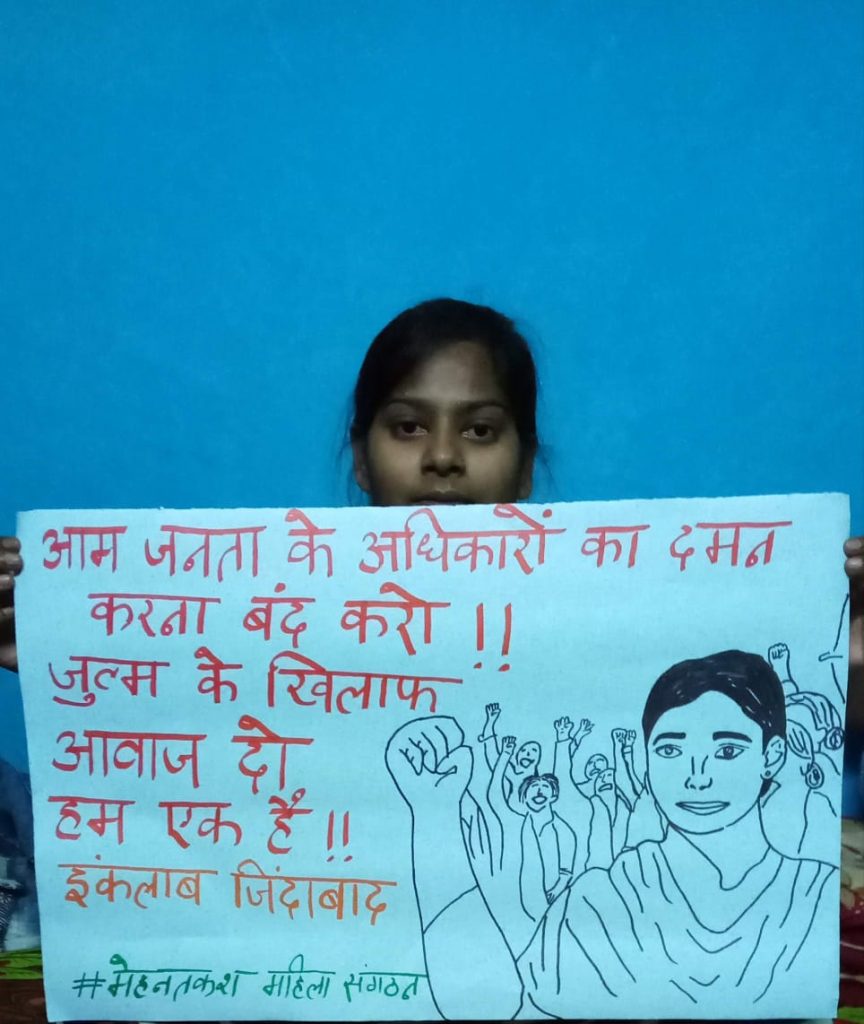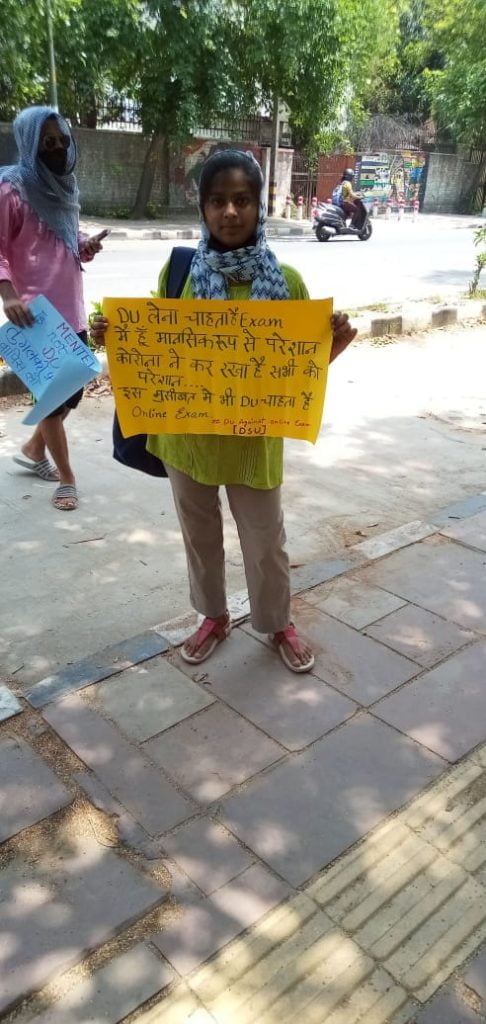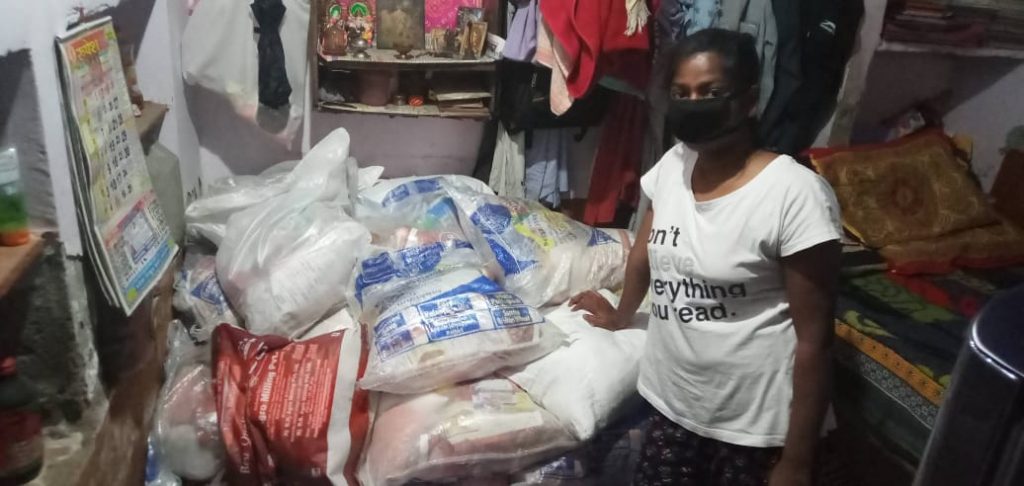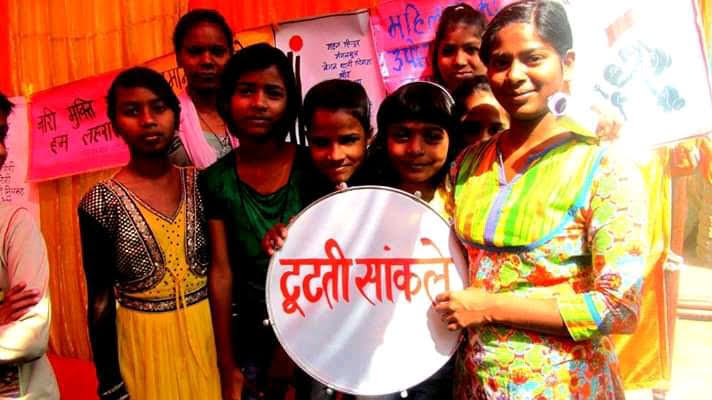It is amidst the hot gusty winds on a blazing afternoon when I see her for the first time. With the sun right above her head, 22-year-old Roshni is busy making ration kits outside a grocery shop in the Jhilmil Industrial Area of East Delhi. The packets have to go for distribution in the next hour. She lifts her left hand to wipe off the rolling bullets of sweat from her cheeks.
Roshni lives with her parents, three sisters, a brother, and a niece in a room less than 25 square yards. In her neighbourhood, her family is among the lucky ones to own the space they live in. It has been over five years since the family lost its livelihood. Her father used to work in a carton factory when the supervisor asked him to leave. According to the factory owner, he was of no use because of his severe joint pain problem. Her mother worked as a domestic help in the bungalows nearby but had to discontinue because of the sudden deterioration in health. The younger sister suffers from malnutrition and had to drop out of school. Roshni worked at a parlour and would manage to make around INR 1500 a month and then joined a factory which agreed to pay her INR 6000 for working 10-hour shifts 7-days a week.
Also read: Lockdown’s Adverse Impacts On Women’s Health In Gurugram’s Slums
Roshni happens to be the first girl from Dosadh tola of her village to be enrolled for university. She is pursuing a Masters in Hindi Literature from Vivekananda College, Delhi University. While the people in her tola admire her for that, there are some neighbours in Delhi who scowl at the fact that the sisters earn and run their household.
The family belongs to the village of Satbari in the Nalanda district of Bihar and has been living in Delhi for the past 35 years. Roshni’s father came to Delhi in search of work. Roshni happens to be the first girl from Dosadh tola of her village to be enrolled for university. She is pursuing a Masters in Hindi Literature from Vivekananda College, Delhi University. While the people in her tola admire her for that, there are some neighbours in Delhi who scowl at the fact that the sisters earn and run their household.
The battle was not won in a day. Roshni was in class 3 when the activist in her was kindled. Some women activists running an organisation named Bal Sanskriti Manch would come every Sunday and distribute storybooks among the children, perform street plays and sing songs to engage the children on topics of religious harmony, education and empowerment. It was on one such evening, when Roshni was humming a song, “Bhaiya Bhaiya Mazdoor Bhaiya”, when a lady from the organisation smiled and came to talk with her. Soon Roshni found herself become a part of the drama team.
With gleaming eyes, Roshni still remembers those days when she used to run out of the house in evenings to join other children for drama practice. In the year 2008, they performed many Nukkad Nataks (street plays) in various basti and slum areas, the names of some of which are Andher Nagri Chaupat Raja, Gadha, Shiksha Ka Circus.
They used to distribute parchas (pamphlets) outside cotton and button factories where women constitute a vast majority of workers. The parchas were written in simple language and focused on issues of women rights, educating girl child, menstrual and reproductive health, domestic violence etc.
By the year 2013, they were a team of 13 women and formed Mehnatkash Mahila Sangathan to work for the rights of working women. The organisation rented a room and opened a library for all. During the day, the library was occupied by young and middle-aged women who came to discuss their problems after finishing their daily chores. After relentless hard work of the organisation, the women in the area slowly began to join the collective newspaper-reading sessions and public talks.
By 2016, Roshni and her team was organising public meetings on the nukkads of their basti. They also screened documentaries and movies on gender issues. They ran a campaign to raise awareness on the importance of proper sanitation. The basti used to have unhygienic toilet vans which were not sufficient for the total population in the area. The organisation mobilised the women in the area and protested for the building of new public toilets. Their demands included the installation of dustbins and proper toilet flush facilities. They also demanded the cleaning of public toilets twice daily. Most of the demands were fulfilled after months of resistance by these women.

With her fists held up as a reflex while talking about injustice, Roshni added, “The demand for appointment of women sanitation workers still needs to be met. The women in the basti feel uncomfortable when they have to ask for sanitary napkins from the male workers. They resort to unhygienic methods such as used cloth, ashes and husk sand. This needs to be stopped. We were told that the administration was running short of funds. But after running from pillar to post for this demand, we realised that the funds for giving salaries to women sanitation workers reach the department but the money gets eaten into by the officials. We will continue our fight against the corrupt department.”
When Roshni was in tenth standard, her elder brother died of alcoholism. His lungs were damaged and he was suffering from serious respiratory problems. With her head bowed down, she recalls, “That morning, my brother was palpitating, his windpipe was blocked. Within a few minutes he passed away.”
WHO global status report 2018 stated that ‘Alcohol kills 2.6 lakh Indians every year either by causing liver cirrhosis, cancer or leading to road accidents caused by drunk driving.’ And today, alcohol continues to be infused with poverty, domestic violence and child abuse. Roshni remembered, how in the year 2014, her friends and she protested against illegal sale of liquor, a few blocks away in her street. The easy availability of liquor also aggravated domestic violence in the area. The organisation continued to protest against this and made various complaints to the police. After nine months of campaign again alcohol abuse, they won the battle and the sale was finally curbed, said Roshni.
During the 2016 chikungunya outbreak in Delhi, Roshni, along with the other members of the organisation took help from some doctors and arranged health camps in her basti where 2-3 people in almost every family, were bedridden due to chikungunya and nobody could go to work, she said. Most of the hospital beds were occupied. They approached all MLAs and Parishads in the area with a memorandum on measures to curb the spread of the disease but could not receive much help.

It was this unwavering spirit to fight against injustice that Roshni a prominent face during the anti-CAA-NRC campaign in her basti. Her team used to carry a door-to-door campaign for raising awareness on the law and its consequences.
With the increasing popularity of the campaign, some local goons entered her house and tried to intimidate her sisters and mother. Despite all that, Roshni fearlessly continued her fight for a better world. She would spend hours convincing families in the neighbourhood that higher studies are ‘safe’ for women. She smiled proudly when she said that now every year at least 6-7 girls in her basti go for pursuing bachelors.
Roshni says that when she reads novels, she comes across phrases like ‘near the river’, ‘golden grass’, ‘beautiful flowers’, and feels hollow for never getting time to gaze at the stars. “I never sat with my legs dipped in the river. I never enjoyed college life. Even in those days, I was working in factories, was searching for work.”
With her own situation in ruins and her family somehow scraping a living, imagining Roshni as a volunteer and a social activist seems impossible. But here she was, standing up after arranging all the ration packets in the cartons. It was a week after the announcement of lockdown when she had got to know that her neighbour, Aslam chacha’s (name changed) family didn’t have a single grain to eat and even his children had to sleep on an empty stomach for two days.
It, however, did not come as a shock to Roshni. She had always known the taste of hunger, that feeling when the stomach twitches and cries out for food but we are too weak to even utter a word. She couldn’t sleep that whole night. She took her notepad and sneaked out of her home to make a list of the people she could ask to donate. And that is how this COVID-19 related relief work started. Since then, she and her friends collect funds, buy ration and distribute the packets to the needy households. They also provide basic financial help to those who are sick during this lockdown.

While arranging ration packets on a rickshaw, she smiled at me and added, “I feel empowered when people come to me to discuss their problems and look up to the organisation to help them. I want to continue my activism forever.”
Also read: ‘Atmanirbhar Bharat’: A Caste And Gendered Reading Of ‘Self-Reliance’
Today, when our world stands at a juncture of witnessing one of the deadliest epochs in the history of humanity, we find the economy falling apart due to the havoc caused by COVID-19. When the world is living in these grim shadows, young girls like Roshni prove that even amid the darkest of storms, light (Roshni) finds its way out.
Today, when our world stands at a juncture of witnessing one of the deadliest epochs in the history of humanity, we find the economy falling apart due to the havoc caused by COVID-19. When the world is living in these grim shadows, young girls like Roshni prove that even amid the darkest of storms, light (Roshni) finds its way out.
“I wish that every marginalised girl in this basti, in fact, every marginalised girl under the sun, continues to strive to make this world a better place. We need the world to stop pointing fingers at us. Its time to organise and think not as individuals but as a society,” Roshni quipped.
When questions echo inside Astha’s heart, she bleeds journalism. When answers cease to come, she bleeds fiction. Contributor @TheCitizen_in,@YouthkiAwaaz, @HardNews, @Kafila. She can be found on Facebook and Twitter.
All pictures as provided by the author.




